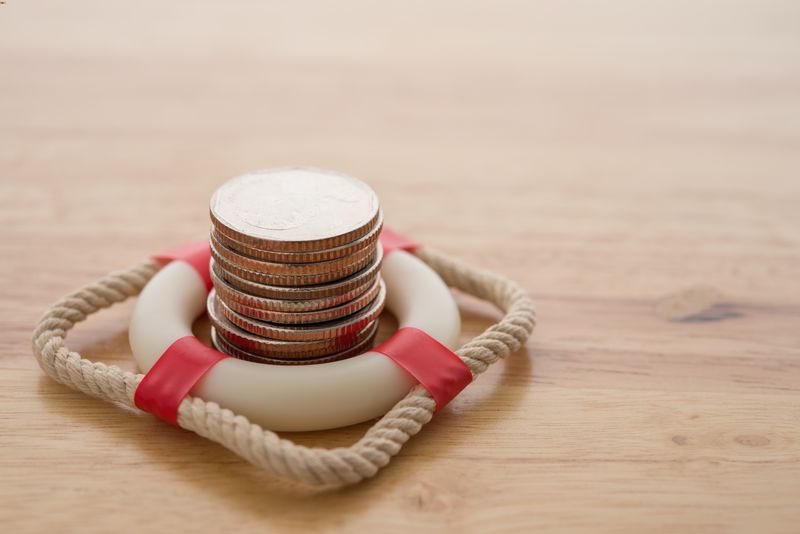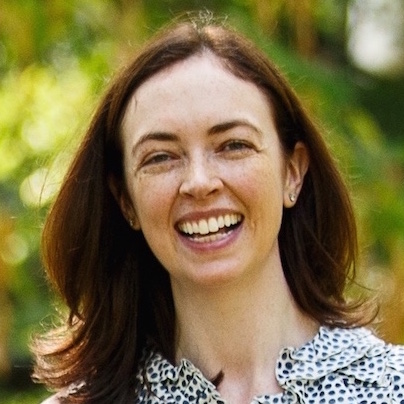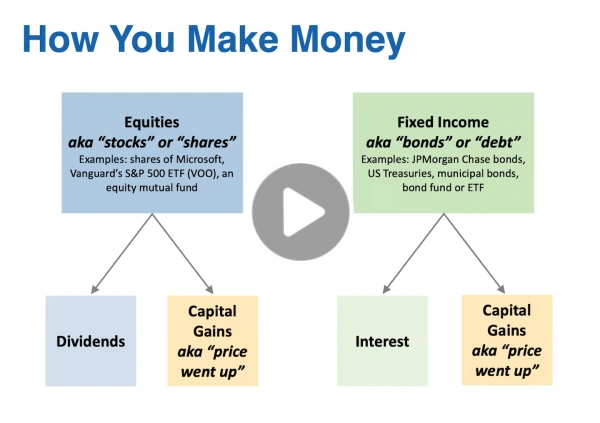"Emergency fund" is typically taken to mean a bank account holding the funds you'd rely on in the event of a job loss or other unexpected financial hardship.
A common rule of thumb is to set aside 3-6 months’ of essential household expenses, but holding 3-6 months’ of expenses in a bank account is often NOT the best approach.
To be clear, you definitely need an emergency fund, and a chunk of it should be in a bank account (“liquid”). As the old saying goes, "$#*! Happens," and when $#*! does happen, you definitely don't want credit cards to be your first line of defense.
But prioritizing saving 3-6 months’ of expenses in a bank account (even a high-yield online account) can lead to a lot of missed opportunities, including:
- missed retirement savings account contributions
- missed employer matches
- a big chunk of your savings stuck in a barely-keeps-up-with-inflation-if-you're-lucky investment
You can minimize the impact of these missed opportunities by sizing your emergency fund appropriately for your likely emergency scenarios.
How to size your emergency fund
Sometimes, when you're thinking about sizing your emergency fund, you can talk yourself into a place where you end up feeling like you're preparing for Armageddon.
Instead, I like to break "emergency fund" down into core emergency fund and extended emergency fund.
The core emergency fund is what you'd need to handle a "not too hard to imagine" downside case.
The extended emergency fund is what you'd need to handle a "wow, when it rains it pours" downside case. This is a bigger number and includes your core emergency fund.
To find the right number for you, consider these factors:
(a) If you (and/or your spouse) lost your job, how long would it take to find another job with comparable pay?
(b) If you (and/or your spouse) were unemployed, would you have access to meaningful supplementary income?
This could come from unemployment insurance, support from a union, or help from family members (if you've not had an explicit conversation with family stating they'd be willing and able to help, I'd assume zero).
(c) Are there other factors in your life that could reasonably cause significant unexpected expense?
This could include a health condition, something going awry with your home or car, or a close relative facing challenges and needing your support.
Now let's talk through some examples
Imagine Vijay and Ann are working parents of two children. Vijay is a software engineer, and Ann also works full time.
A "not too hard to imagine" downside scenario for their family could happen if Vijay's company downsized, but Ann remained employed, and it took 2 months for Vijay to find his next opportunity as a software engineer. But a "when it rains, it pours" downside scenario could take one of several forms. In example A, it might take Vijay 5 months to find new employment as a software engineer, while Ann remains employed. In example B, both Vijay and Ann lose their jobs at the same time, and it takes them 5 months to find work.
Whether A or B is the right scenario to plan for in their family comes down to their professional situations and the market for those jobs. If Ann's a tenured computer science professor, Ann and Vijay losing their jobs at the same time and taking 5 months to both find work is unrealistically severe. If Ann is a trader (much less job stability), then they probably should contemplate a scenario where they're both unemployed. But maybe—given the high demand for software engineers—they don't need to assume 5 months’ of unemployment.
In that "two unemployed working parents" scenario, Vijay could take the next available job, rather than holding out for something he loves. And perhaps Ann would decide that she'd "lower the bar" a bit on her ideal next opportunity in that scenario, too.
Perhaps the right "when it rains it pours" scenario for Vijay and Ann to plan for actually looks like example C: both Vijay and Ann lose their jobs around the same time. Vijay takes a job with comparable pay within 2 months, and Ann takes up to 4 months to find the right role.
Finding the right "downside scenarios" to plan for with your family is really about having an open, honest discussion about what life might look like if things don’t go quite as expected.
To calculate your emergency fund:
Take the # months you would need to find a comparably paid job* and multiply by "essential" monthly household expenses (aka "stuff you couldn't quickly cut out”) minus monthly supplementary income. This is your emergency fund goal.
*Like with Vijay and Ann, be sure to consider both your "not hard to imagine" scenario and your "when it rains it pours" scenario when determining your time multiplier. If you came up with less than 2 months, I'd suggest reconsidering your assumptions. Even if your profession is in extremely high demand it can be helpful to give yourself a little time to be sure the next opportunity is the right one.
Now that you have a goal number, take a critical look at it. Does it look big enough to handle other factors in your life that could reasonably cause significant unexpected expense? If not, bump it up. If yes, you're good to go!
Now that you have your target emergency fund in mind and an idea of what's "core" versus "Extended," we can talk about whether putting all of it in a bank account makes sense.
Ready to learn more about managing your financial priorities?
Check out our interactive AboveBoard Financial Action Plan.
What you can do to protect yourself if you're not able to work due to injury or illness
An emergency fund helps if you are in between jobs or something unexpected comes up for a few months.
But what happens if an illness or injury prevents you from working for longer than 3-6 months?
Do you have enough disability insurance to ensure that your and your loved ones' lifestyle and dreams would not be derailed if you became too ill or injured to work?
Get a disability insurance quote to ensure that a health crisis would not become a financial crisis, or request a free review of your workplace plan by emailing us at hello@aboveboardfinancial.com - simply say "free workplace disability benefits review" (or something like that) in the subject header.
Important note: If you don't pay your credit cards in full each month, those credit card balances should be paid down to zero before you start building an emergency fund.



